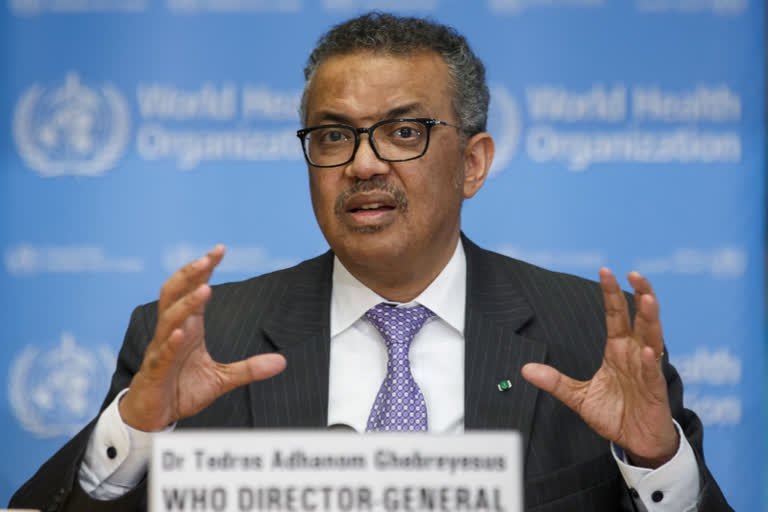New Delhi: Preparing for the much needed COVID-19 vaccines, the World Health Organization today organized a meeting of vaccine manufacturers and national regulatory authorities from its South-East Asia Region.
"The manufacturing capacity that exists in our Region is of the quality and scale required to produce and roll-out a COVID-19 vaccine globally. This Region is a vaccine manufacturing powerhouse, and it must now also play a lead role in overcoming the ongoing pandemic,” said Dr. Poonam Khetrapal Singh, Regional Director, WHO South-East Asia.
At the virtual meeting, leading producers from India, Indonesia and Thailand discussed timelines and production capacity, while regulatory bodies deliberated on changes that would be needed in processes to make COVID-19 vaccines available at the earliest.
Several steps must be completed before COVID-19 vaccine can be used on a large scale. These include pre-clinical and clinical trials, production, licensure, deployment of vaccines and plans for post-marketing surveillance.
Outlining the full landscape of vaccine development activities in the Region will help coordination with global stakeholders, and support countries preparing COVID19 vaccine deployment plans, she said.
Globally, WHO has assembled a broad coalition of scientists, researchers and industry partners to develop and evaluate candidate vaccines for COVID-19. More than 120 potential vaccine candidates have been proposed globally, and WHO continues to track their type and progress. Seven candidate vaccines are already in clinical evaluation and 82 vaccines are in pre-clinical evaluation.
Last week, WHO launched the Access to COVID-19 Tools Accelerator, which brings together key global health actors, private sector partners and other stakeholders to accelerate the development and production of COVID-19 essential health technologies, including vaccines, and to help guarantee equitable access. The launch of the initiative comes in the wake of a UN General Assembly resolution through which Member States called for all countries to have “equitable, efficient and timely” access to any future vaccines developed to fight COVID-19.
Dr. Khetrapal Singh said, “All countries are now preparing to safely transition towards a ‘new normal’ in which social and economic life can function amid low or no COVID-19 transmission. As countries continue to assess and minimize risks, they are very much aware that we are in this together and must get through it together – that no country is safe until we all are safe, for which an effective vaccine that is accessible to all is needed.”
“We are also working to ensure that, once developed, safe and effective COVID-19 vaccines are available to all of humanity. To do that, we are coordinating expert consultations, developing target product profiles and supporting clinical trials. For the Region and for the world, WHO is committed to facilitating and coordinating your efforts,” the Regional Director said.
India, Indonesia and Thailand are among the world’s largest vaccine manufacturers.
“As we mark World Immunization Week, we must build on our success and redouble our efforts to ensure all people in the Region can access the life-saving benefits vaccines bring. Yes, the COVID-19 pandemic is a unique challenge. But I am certain that through collaboration and innovation we can produce a vaccine faster than ever before, while maintaining all standards,” Dr. Khetrapal Singh said.
In other news, hospitalized patients with advanced COVID-19 and lung involvement who received remdesivir recovered faster than similar patients who received placebo, according to a preliminary data analysis from a randomized, controlled trial involving 1063 patients, which began on February 21.
The trial (known as the Adaptive COVID-19 Treatment Trial, or ACTT), sponsored by the National Institute of Allergy and Infectious Diseases (NIAID), part of the National Institutes of Health, is the first clinical trial launched in the United States to evaluate an experimental treatment for COVID-19.
An independent data and safety monitoring board (DSMB) overseeing the trial met on April 27 to review data and shared their interim analysis with the study team. Based upon their review of the data, they noted that remdesivir was better than placebo from the perspective of the primary endpoint, time to recovery, a metric often used in influenza trials. Recovery in this study was defined as being well enough for hospital discharge or returning to normal activity level.
The first trial participant in the ACTT trial was an American who was repatriated after being quarantined on the Diamond Princess cruise ship that docked in Yokohama, Japan and volunteered to participate in the study at the first study site, the University of Nebraska Medical Center/Nebraska Medicine, in February 2020.
Remdesivir, developed by Gilead Sciences Inc., is an investigational broad-spectrum antiviral treatment administered via daily infusion for 10 days. It has shown promise in animal models for treating SARS-CoV-2 (the virus that causes COVID-19) infection and has been examined in various clinical trials.
ALSO READ: 45-day-old baby recovers from COVID-19 in Telangana



